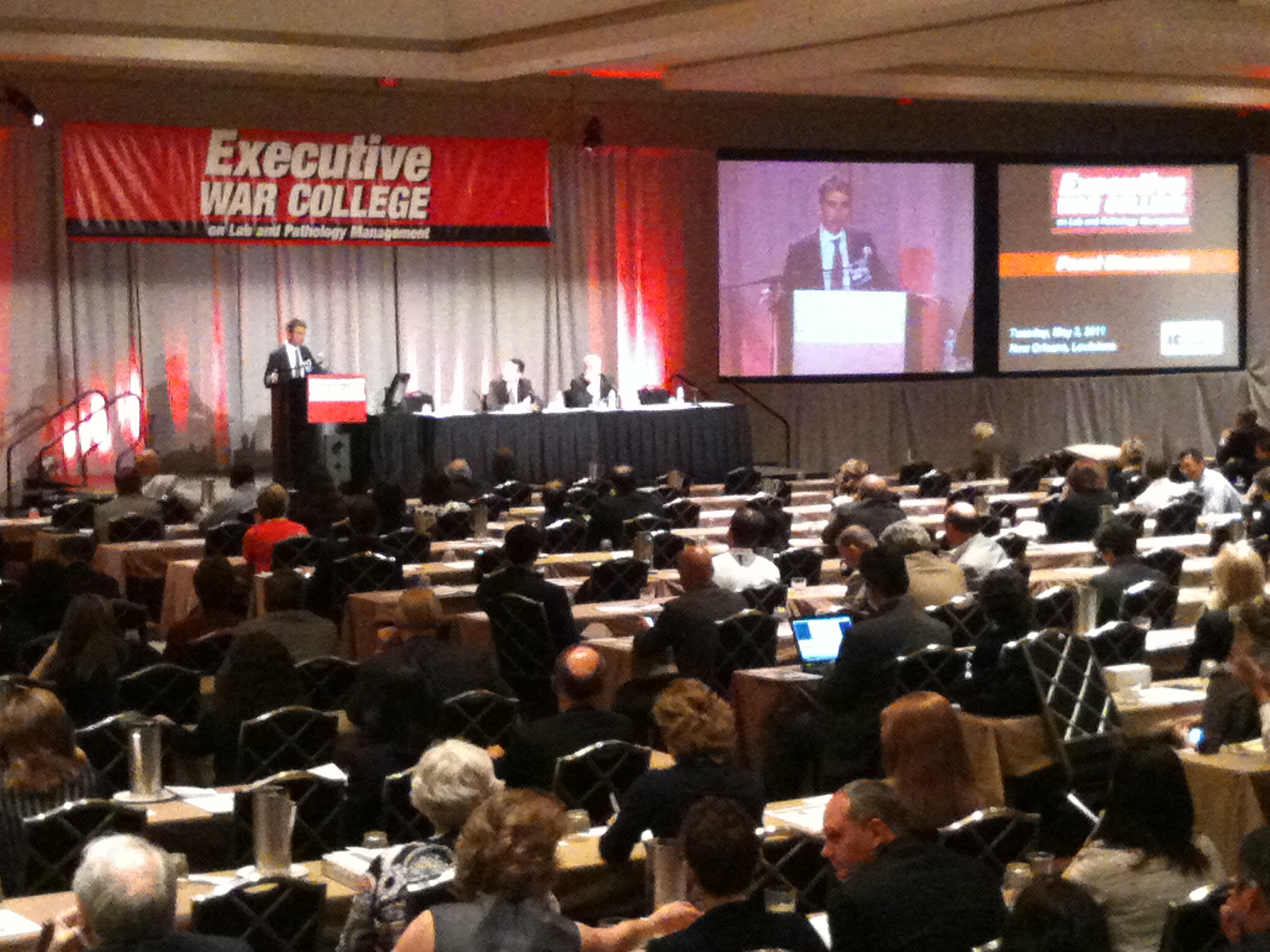Record crowd of pathologists and clinical laboratory managers hear from medical lab industry leaders
Dateline: New Orleans, Louisiana—Here at the 16th annual Executive War College (EWC) on laboratory and pathology management, a crowd of record size has gathered to learn the latest trends in the clinical laboratory testing marketplace, and to hear about innovations and new management breakthroughs, as shared by top-performing medical laboratories.
As your Dark Daily editor, this is my first EWC. Readers of Dark Daily’s ebriefings (darkdaily.com) know me from my articles on the website. I’ve learned much about clinical laboratories and anatomic pathology groups since joining The Dark Group last year. And though my editorial background includes a recent six-year stint as Editor of Health Management Technology magazine, I was nevertheless impressed by the depth of information being offered at EWC. It is why this is truly the “must attend” conference for lab managers and pathologists.

Executive War College general session panel, Tuesday May 3, 2011
My Impressions of Medical Laboratory Management Topics at the EWC
I’d like to share with you some of the highlights of the sessions that took place yesterday. EWC’s founder and host, The Dark Report‘s (TDR) Editor-in-Chief, Robert Michel, opened the first day general session by saying that, as the major reforms mandated by ObamaCare take place “The way doctors order and use tests is going to change,” and that “whenever there is change, there are opportunities.”
Michel noted that government spending at the federal, state, and local levels is at record highs, but will still be inadequate to fund the ever-increasing cost of healthcare in the coming years. He went on to state that the earliest signs of inflation can be seen across the American economy. If sustained, this inflation will have measurable effects on the level of reimbursement that is paid for clinical laboratory testing.
Next to speak was Rhonda Becker, MPA, Clinical Laboratory Manager, UC Davis Medical Center, Specialty Testing Center, Sacramento, California. UC Davis recently designed and built a brand new 645-bed hospital. This gave Becker and her lab team the opportunity to design a state-of-the-art lab with the latest generation automation designed to serve an integrated-care environment. She said that UC Davis removed nearly all time-consuming manual processes and replaced them with “hands-free” processing for 80% of the new lab’s workflow.
She also stressed that, among other things, when designing a new laboratory environment, it’s crucial to:
- “Look at processes and workflow, and ensure that your form follows function, and,
- “Use a Lean process map to analyze the entire pre-analytical to post-analytical lab workflow.”
Following Becker was Rick Panning, MBA, who is Vice President Laboratory Services at Allina Hospitals and Clinics in Minneapolis, Minnesota. Like Rhonda Becker, Panning also had the opportunity to design and build a state-of-the-art clinical laboratory to serve Allina’s 11-hospital, 77-clinic health system. In his presentation, Panning explained not only how to design labs to serve future medical homes and Accountable Care Organizations (ACO), but also how to go about gaining approval to complete the project. His approach at Allina was to make a “case for change” with the hospital’s senior leadership. In it, he explained why:
- The core central lab must be replaced,
- The new expanded central facility will realized financial benefits for the hospital, and how,
- The new lab design would enable the completion of remaining opportunities for lab consolidation.
Mark Boguski, M.D., Ph.D, Beth Israel Deaconess Medical Center offered insights on how the use of human genome sequencing will improve patient care. He said that while today it costs about $10,000 to sequence a whole human genome, by 2015 that cost could drop to around $250!
He went on to state that the “real” benefit of genetic sequencing to modern healthcare will be preventative medicine and cost avoidance, that in 18 months today’s instrumentation will be obsolete, and that interpretation of data is the high-value product.
Dr. Boguski also explained why a clinical-grade knowledge base is urgently needed to bring whole-genome sequencing tools into diagnostic settings. He believes that, because pathologists are in significantly larger numbers than geneticists, they are a better choice to become the first personalized genomic medicine workforce.
Including the breakout sessions and the afternoon general sessions, there were 29 other distinguished speakers, over the course of today. That was way more information than I can cover—even in brief—in a Dark Daily ebriefing. If you weren’t able to attend this year’s Executive War College don’t worry, recordings of the sessions will be made available on the Dark Daily website in the weeks to follow.
Another noteworthy fact about this year’s Executive War College is that attendance is at record high numbers. This reflects the growing interest of pathologists and clinical laboratory managers in getting early information and analysis about accountable care organizations (ACO), and other significant reforms that are mandated by the Obamacare legislation.
—Michael McBride



